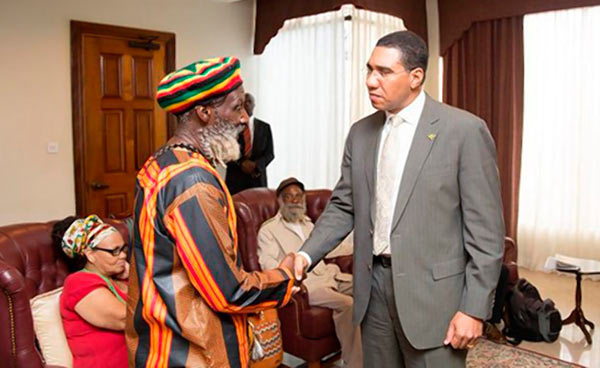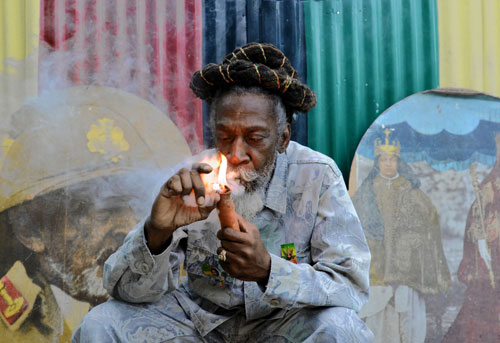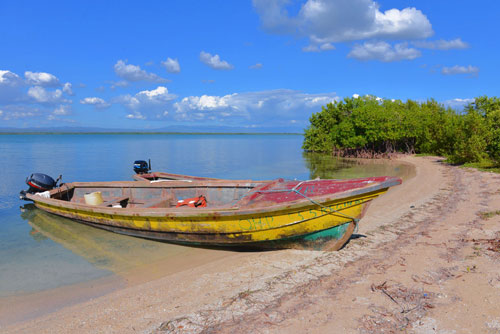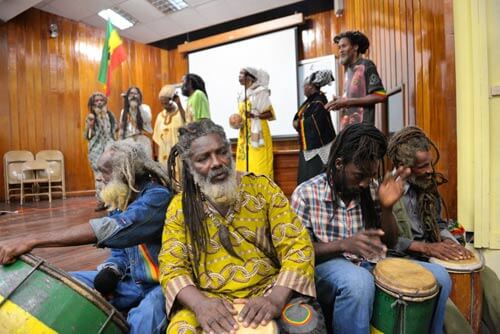In an unprecedented show of remorse and humility, the government of Jamaica took responsibility for a single incident that blamed the island’s total Rastafarian population for the death of eight individuals in a farming community 10 miles east of the second city of Montego Bay 54 years ago.
Stigmatized and persecuted since 1963, “the Rastafarian community has harbored feelings of bitterness and resentment over the years.”
Prime Minister Andrew Holness — with endorsement from Peter Phillips, Opposition People’s National Party leader — acknowledged the wrongful actions his government perpetrated in 1963 following the deaths of several persons in a farming community known as Coral Gardens.
“Fellow Jamaicans, the Coral Gardens Incident was a grave injustice. The government acknowledges that the machinery of the Jamaican state evolved out of an era when it was considered appropriate to utilize the heavy hand of the state against citizens.
“I committed to making an apology for what has come to be commonly referred to as the Coral Gardens incident; one which occurred at a time in our history when our society was more reflective of the colonial era.”
“Today, without equivocation, we apologize for what occurred in Coral Gardens.
We express our regret and sorrow for this chapter in our national life that was characterized by brutality, injustice and repression, which was wrong and should never be repeated.”
“Today, I am honoring the commitment to tender an apology,” Holness said in Parliament recently.
Fifty-four years after the April 1963 atrocity that left eight persons dead, the leader formally apologized for unjustified treatment by his party’s leaders who endorsed the beatings, imprisonment and humiliation endured by Rastafarians many of whom were forcibly trimmed of their trademarked dreadlocks in retribution of the incident.
Maligned by association, Rastafarians endured persecution throughout the island resulting with longstanding distrust and bitterness towards the nation’s leaders.
Reportedly, 54 years ago, seven Rastafarians were killed by police and dozens more injured after bearded men set a gas station on fire and killed its owner during a land dispute.
In the aftermath of the attack, “the Rastas and a policeman were killed, and another policeman chopped several times and hospitalized for months.”
Allegedly, “the incident sparked a nationwide persecution against Rastas” endorsed by the governing JLP.
Holness said that the decision to make a formal apology was due to a report presented by the public defender, and should be regarded as an “important first step in our national effort to reflect on, in a very focused way, an unfortunate chapter in our nation’s history.”
In addition to the apology, the PM announced a number of tangible steps his government is committed to pursuing in order to repair the age-old tarnished image of a segment of the society.
One of them includes a trust fund “of no less than $10 million to be established for the benefit of survivors.”
He added that “six lots at the property at Pinnacle in St. Catherine will be declared by the Jamaica National Heritage Trust as a protected heritage site and will be developed as a Rastafari heritage and cultural center.”
“Whilst I know that this cannot erase the brutality, oppression and injustice which was meted out during that tragedy, I am comforted by the willingness of the members of the Rastafari Coral Gardens Benevolent Society to keep the dialogue going.”
Although members of the House of Representatives seemed heartened by the bi-partisan announcement Miguel Lorne, legal advisor to the Coral Gardens Benevolent Society did not appear impressed by the government’s gesture.
As a matter of fact, Lorne described the apology as “unsatisfactory.”
“The apology falls short,” Lorne said. “While we accept the apology, because it’s a start, it is not enough. You must apologize to the Rastafari community worldwide.”
He explained that after the tragedy Rastas were persecuted, threatened and hunted by police who offered $3 as bounty to anyone willing to implicate a member of the community.
“Families would put out their own children who became Rastas. Rastas were stoned and beaten. They were not accepted on public transport and had to travel in gullies.”
“So, an apology to the victims is barely enough,” Lorne said.
Of the compensatory reparation, Lorne added “That amount is disrespectful. We cannot accept that. For what has been suffered they should offer much more. We may seek legal redress.”
Twenty-one families have been identified as benefactors and victims of the egregious assault.
The PM gave assurances that those families will be redressed with counseling and other social serving provisions.
He described the action as one of the many “milestone” accomplishments he committed to when he campaigned to become leader of the country.
“As proud Jamaicans, we value and honor our present day constitutional democracy, built on our rich and, in many instances, painful heritage of struggle and suffering.
However, notwithstanding the inhumane treatment and repression, there were and continue to be narratives of resilience, many still untold, of great achievements and victories for those who endured.
We have been able to draw on these experiences to hone an unbridled creative imagination that has presented to the world unique and innovative sound, images, icons and a way of life that have brought us recognition and pride.
Pain, born of the past, however, still resides in the hearts of many.”
“In expressing our regret as a people and as a community, we have taken a symbolic, yet courageous and pivotal move, which means that we can face the future with renewed hope, with increased resolve and in a true spirit of reconciliation.
In keeping with our Charter of Fundamental Rights and Freedoms which amended our constitution in 2011, the government of Jamaica assures this great nation that we will continue to strive to ensure that unjust incidents and discriminatory actions such as occurred at Coral Gardens, are never allowed to happen again.
I am happy to have finally reached the point where we can discuss concrete and tangible actions which can ease some of the heavy burden that survivors and the community have faced.
“Some will say it’s not enough…but to be realistic it’s a good beginning,” Rastafarian activist and cultural consultant Barbara Blake Hannah said.
Catch You On The Inside!



























